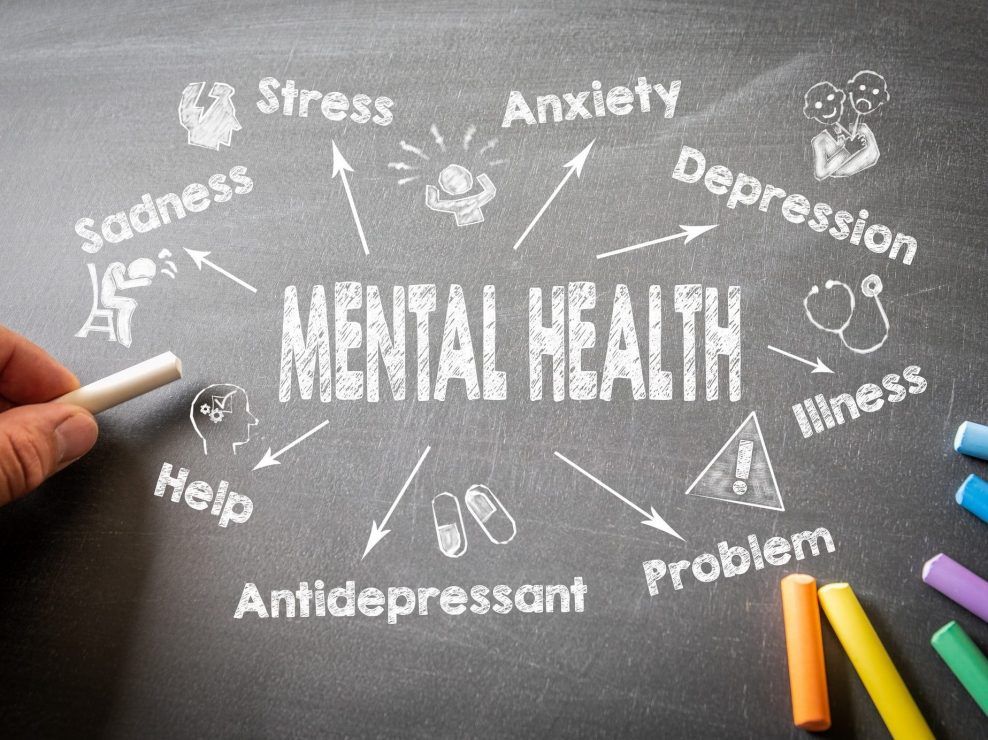Post?
We’ve had Mental Health Day, Mental Health Week, and now Mental Health Month – but for many Canadians, it might as well be mental health year. People have been struggling with post-pandemic fears for a while now, and numbers are grim for those struggling with such debilitating issues as stress, depression and anxiety.
A recent survey by The American Psychological Association (APA) is reporting Americans are “struggling with multiple external stressors that are out of their personal control, with 27% reporting that most days they are so stressed they cannot function,” notes a recent media release.
What is everyone worrying about? Inflation, violence and crime seem to be topping the list, along with the current political climate. People across North America are also stressing over the rising costs of everyday living – even grocery shopping can bring on anxiety and stress.
The U.S.-based nationwide survey, conducted by The Harris Poll on behalf of APA, revealed that 70% of adults reported they do not think people in their government care about them, and 64% said they felt their rights are under attack. Further, nearly half of adults (45%) said they do not feel protected by the laws – and more than a third said they’d consider moving to a different country.
One country that’s topping the list is Canada. Forbes recently reported a spike in Americans looking to emigrate to Canada the moment the U.S. Supreme Court overturned Roe v. Wade, with Google searches for the topic “how to move to Canada” spiking within hours of the court decision. Today, more Americans are considering Canada as a potential new residence.
But, are Canadians faring any better than their American neighbours in the mental health department? Research shows many haven’t been doing so great after more than two years of pandemic restrictions. LifeWorks (a provider of well-being tech solutions) recently reported that Canadian workers have been measuring a mental health score lower than the pre-pandemic benchmark of 0.0.
“We’re in a mental health crisis,” the company reported on its lifeworks.com website, citing the pandemic, and the move to a digital workforce “have significantly impacted Canadian lives both at work and at home.
“Now we’re seeing one in three people at high risk of a mental health issue,” such as depression, anxiety, and addiction.
It’s not your imagination – more and more Canadians are struggling with these issues. “With the uncertainty of the times, the sudden changes in reality for many due to COVID and the lock-down people have struggled with, managing stress (and) the stressors related to the pandemic … (has) certainly seen more people suffering,” said Dr. Monica Vermani, clinical psychologist and author of A Deeper Wellness: Conquering Stress, Mood, Anxiety and Traumas, in an earlier interview.
The Centre for Addiction and Mental Health (camh.ca) says “the crisis is real,” and that Canada – and the world in general – are in the grips of a mental health disaster that ruins health, threatens lives and hurts economies.
“It’s fair to say that most people still don’t have a true understanding of just how big, onerous, and potentially damaging the crisis really is – on both a societal and personal level,” notes the website, adding, “the numbers simply don’t lie.”
The numbers are alarming: According to the World Health Organization, there are about 450 million people worldwide currently struggle with mental illness, “making it the leading cause of disability worldwide.” Here in Canada, it affects more than 6.7 million people. CAMH is reporting that “one in two Canadians have – or have had – a mental illness by the time they reach 40 years of age.”
These statistics are scary, but they serve as a testament that the stigma of mental health needs to be addressed head on, and that everyone needs to get involved in one way or another.
What can you do? Start by knowing the facts as the first step in creating hope, note CAMH organizers. Look for organizations that can offer a helping hand. One such organization, About Brothers Who Care, is a registered Canadian non-profit, committed to helping members of the Black community by “changing the social, financial and psychological health through stories, images and engagement.”
“Establishing meaningful connections with others is a valuable tool to improve well-being and mitigate stress,” said David Griffiths, founder of Brothers Who Care, (brotherswhocare.com) in a recent media release. “This is important for Black men because of the stigma that mental health has in the Black community. This stigma can create hesitancy in talking about mental health, and emotional experiences, which can result in isolation and suffering in silence. When people feel like they can talk about what they’re dealing with without judgment, it opens avenues to seek care and support.”

 torontosun.com
torontosun.com
We’ve had Mental Health Day, Mental Health Week, and now Mental Health Month – but for many Canadians, it might as well be mental health year. People have been struggling with post-pandemic fears for a while now, and numbers are grim for those struggling with such debilitating issues as stress, depression and anxiety.
A recent survey by The American Psychological Association (APA) is reporting Americans are “struggling with multiple external stressors that are out of their personal control, with 27% reporting that most days they are so stressed they cannot function,” notes a recent media release.
What is everyone worrying about? Inflation, violence and crime seem to be topping the list, along with the current political climate. People across North America are also stressing over the rising costs of everyday living – even grocery shopping can bring on anxiety and stress.
The U.S.-based nationwide survey, conducted by The Harris Poll on behalf of APA, revealed that 70% of adults reported they do not think people in their government care about them, and 64% said they felt their rights are under attack. Further, nearly half of adults (45%) said they do not feel protected by the laws – and more than a third said they’d consider moving to a different country.
One country that’s topping the list is Canada. Forbes recently reported a spike in Americans looking to emigrate to Canada the moment the U.S. Supreme Court overturned Roe v. Wade, with Google searches for the topic “how to move to Canada” spiking within hours of the court decision. Today, more Americans are considering Canada as a potential new residence.
But, are Canadians faring any better than their American neighbours in the mental health department? Research shows many haven’t been doing so great after more than two years of pandemic restrictions. LifeWorks (a provider of well-being tech solutions) recently reported that Canadian workers have been measuring a mental health score lower than the pre-pandemic benchmark of 0.0.
“We’re in a mental health crisis,” the company reported on its lifeworks.com website, citing the pandemic, and the move to a digital workforce “have significantly impacted Canadian lives both at work and at home.
“Now we’re seeing one in three people at high risk of a mental health issue,” such as depression, anxiety, and addiction.
It’s not your imagination – more and more Canadians are struggling with these issues. “With the uncertainty of the times, the sudden changes in reality for many due to COVID and the lock-down people have struggled with, managing stress (and) the stressors related to the pandemic … (has) certainly seen more people suffering,” said Dr. Monica Vermani, clinical psychologist and author of A Deeper Wellness: Conquering Stress, Mood, Anxiety and Traumas, in an earlier interview.
The Centre for Addiction and Mental Health (camh.ca) says “the crisis is real,” and that Canada – and the world in general – are in the grips of a mental health disaster that ruins health, threatens lives and hurts economies.
“It’s fair to say that most people still don’t have a true understanding of just how big, onerous, and potentially damaging the crisis really is – on both a societal and personal level,” notes the website, adding, “the numbers simply don’t lie.”
The numbers are alarming: According to the World Health Organization, there are about 450 million people worldwide currently struggle with mental illness, “making it the leading cause of disability worldwide.” Here in Canada, it affects more than 6.7 million people. CAMH is reporting that “one in two Canadians have – or have had – a mental illness by the time they reach 40 years of age.”
These statistics are scary, but they serve as a testament that the stigma of mental health needs to be addressed head on, and that everyone needs to get involved in one way or another.
What can you do? Start by knowing the facts as the first step in creating hope, note CAMH organizers. Look for organizations that can offer a helping hand. One such organization, About Brothers Who Care, is a registered Canadian non-profit, committed to helping members of the Black community by “changing the social, financial and psychological health through stories, images and engagement.”
“Establishing meaningful connections with others is a valuable tool to improve well-being and mitigate stress,” said David Griffiths, founder of Brothers Who Care, (brotherswhocare.com) in a recent media release. “This is important for Black men because of the stigma that mental health has in the Black community. This stigma can create hesitancy in talking about mental health, and emotional experiences, which can result in isolation and suffering in silence. When people feel like they can talk about what they’re dealing with without judgment, it opens avenues to seek care and support.”

Canadians continue to struggle with mental health issues post pandemic
We've had Mental Health Day, Mental Health Week, and now Mental Health Month.









